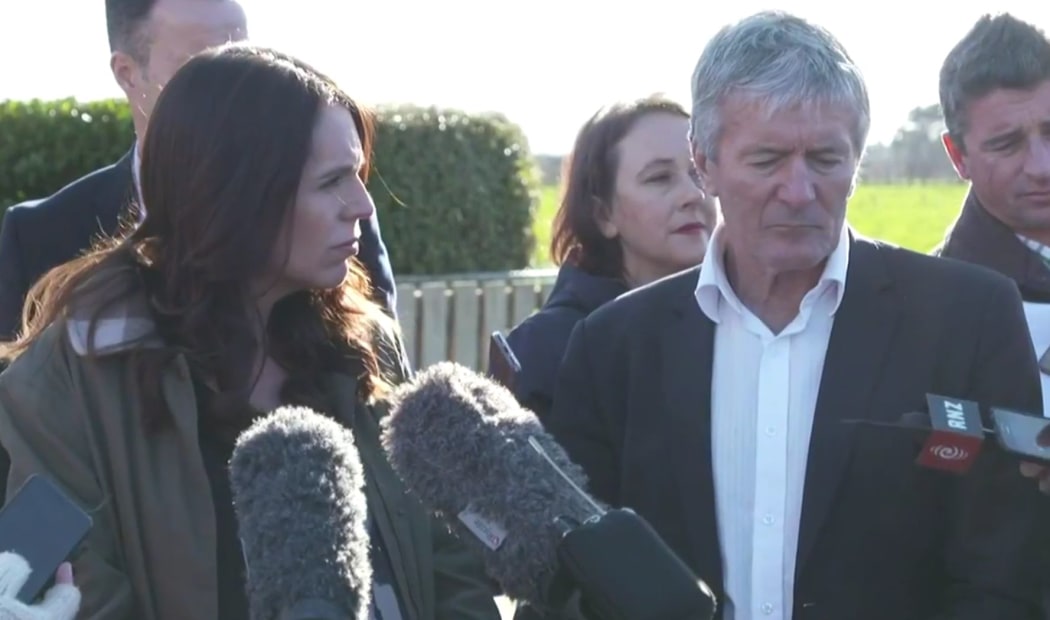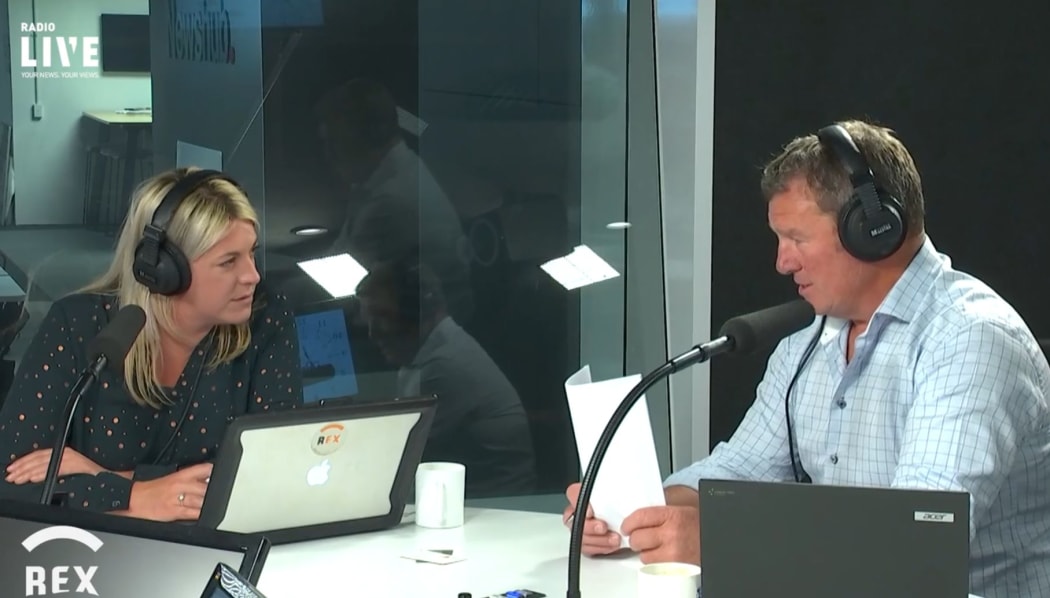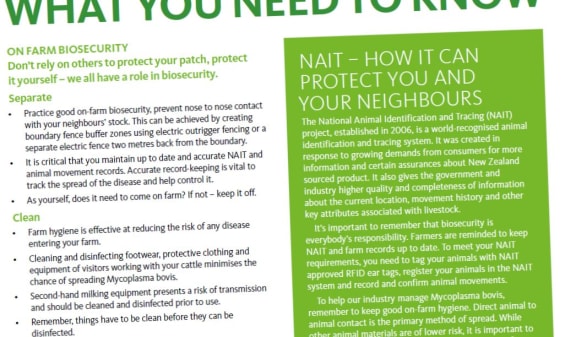The government and farming leaders spoke with one voice on the plan announced this week to combat mycoplasma bovis - but farmers are divided on it. Their genuine anger and anguish has been front and centre in the media but awkward questions about the spread of disease have yet to be fully aired or answered.

PM Jacinda Ardern and agriculture and biosecurity minister Damian O'Connor addressing reporters in South Canterbury. Photo: screenshot / RNZ
"Setting aside the disastrous ecological impact suffered by native species since human arrival, Mycoplasma is the worst economic pest or disease to land in New Zealand,' Stuff rural reporter Gerard Hutching wrote last Monday - the day the government decided on a wider cull of cattle to try to eradicate the disease here.
The nearly nine hundred million dollar bill was also the biggest of its kind in our history so far, he added.
It was a pretty stark summary of the situation.
Both government and opposition backed what the PM called “the one shot” to defeat the disease and her words echoed by other farming leaders.
The chair of Beef and Lamb New Zealand - a Southland farmer himself - said the decision had “the best long-term interests of the wider pastoral sector in mind.” But he also acknowledged that farmers themselves were not of one mind.
RNZ’s reporter Tim Brown discovered that when he went to Winton, the Southland town he described as “ground zero of the Mycoplasma bovis outbreak.”
He said those at the local pub were “vehemently opposed to the move, labeling it ridiculous and doomed to fail.”
Some journalists weren't happy with it either - and let their audience know.
The most vocal was Duncan Garner who told his listeners and viewers “murdering cows” won’t work.
Citing unnamed sources, he accused MPI of "dropping the ball" on his AM show on TV channel Three and on Radio Live.
He also pointed the finger at the last three ministers in charge, especially Nathan Guy from the former National-led government.
He urged Mr Guy to come on his show to talk about it, but two days earlier Newshub had published an opinion piece penned by Nathan Guy in which the MP defended his own record when in office:
Duncan Garner also accused MPI of neglect and having no plan for M Bovis - or even more serious diseases like foot and mouth - in the Dominion Post last weekend.
MPI’s Chief Operations Officer Roger Smith wrote a strong rebuttal to Stuff which the ministry also published first on Facebook.
"Duncan Garner’s recent opinion piece about MPI’s response to Mycoplasma bovis is factually incorrect in places, and unintelligible in others," he wrote.
“Once Duncan Garner has taken the time to do his homework, perhaps he would like to apologise to our staff who work day and night to protect our country from unwanted pests and diseases,” he added.

"They should have their arses kicked . . and their animals taken away" - Richard Loe clashes with Rural Exchange co-host Sarah Periam. Photo: screenshot / Rural Exchange
Newsroom.co.nz’s South Island correspondent David Williams reckoned Duncan Garner “pitched his criticism, rightly, at the top, at senior management and at the ministers who’ve overseen the issue."
“In my opinion, Roger Smith talked when he should have been listening,” he wrote.
But if Roger Smith was convinced he - along with the rest of the public - are being misinformed in the mass media, it's fair for him to respond in public - possibly even essential.
Farmers' anguish and anger about the M Bovis decision have been well canvassed by the media this past fortnight. That's helped the public understand what the disease is doing to them and their businesses.
But some journalists pointed out that the full focus has yet to fall on some farmers vets contributing to the spread of the disease.
Many farmers have not bought into the National Animal Identification Tracing scheme - NAIT for short - introduced in 2012.
"If you're sending animals off to graze this week and you haven't got your compliance and animal health declarations done, you need your arse kicked your animals should be taken away from you," host Richard Loe said on Radio LIve's show Rural Exchange last weekend.
Based on what we’ve learned this week, the former All Blacks hard man would have to be kicking a lot of arses.
Back on the 11th of May, agriculture minister Damian O’Connor told Newshub Nation 70 percent of farmers were not tracing cattle movements properly through the NAIT system - and some have traded cows on a black market, making it even harder to to track infected ones.
"In the six years since NAIT was introduced, only one infringement fine of $150 has been handed out. The maximum fine is $10,000," Stuff's Gerard Hutching reported.
Taxpayers are now being expected to pick up the tab for some of the consequences of the latitude that has been extended to farmers, Gordon Campbell pointed out on Scoop.co.nz.
Farmers have been repeatedly reminded about their responsibiilties.
Back in February - when just seven infected herds had been culled at 20 infected properties - a special Mycoplasma Bovis edition of Fonterra’s monthly magazine FarmSource reminded farmers of NAIT's importance.

Fonterra's 'FarmSource' magazine reminded farmers of their NAIT responsibilities in February. Photo: screenshot
Even though the total numbers of cows to be culled is well over 100,000 thousand and some farm operations will be devastated, it is still only a fraction of the total number culled in an average year.
Have the media over-played or underplayed the crisis?
Sarah Perriam, producer and host of Rural Exchange, told Mediawatch the mainstream news media has been fair and responsible, but they have only recognised the seriousness of it in the past month.
"We need to ensure our taxpayer dollars are being spent wisely on biosecurity," she said.
"It is responsible to talk about foot and mouth because it's all very and good to have a plan in the top drawer but if you've got no trust and confidence among farmers to report disease to MPI and fear of how long compensation would take to come - you might as well take it out the back, shoot it and bury it," she said.
She said there's "a lot of homework and research still to go in the media" on the effectiveness of NAIT.
"That's the next story," said Sarah Perriam.

